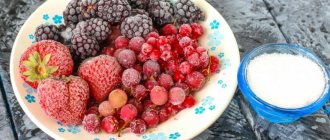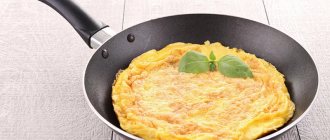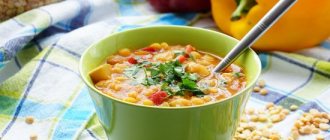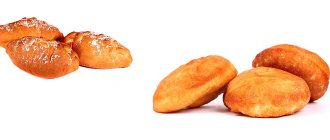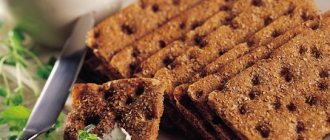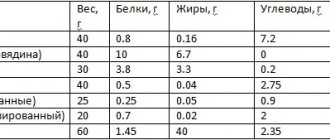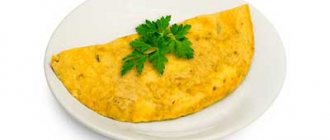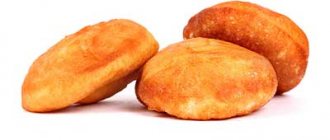Classic beetroot soup is a close relative of the popular borscht. The recipe for a light and dietary beetroot soup involves a cold soup based on young beets. Unlike borscht, there is no cabbage here.
There are many different interpretations of beetroot soup: with the addition of spices, various vegetables and served hot. In this article we will look at whether beetroot can be on a diet, its features and preparation nuances. The following recipes will help add variety to your diet.
Is this soup possible on a diet?
Beetroot soup is ideal for the diet of people who are losing weight. It helps to correct excess weight, promotes cleansing and healing of the body with minimal calories. The beets included in the composition provide great benefits for digestion and metabolic processes in the body. Properties of beetroot in dietary nutrition:
- has a mild laxative and diuretic effect;
- due to natural vegetable fiber, it improves gastrointestinal motility;
- increases the body’s immune capabilities and prevents the development of vitamin deficiency during the diet;
- has a positive effect on fat metabolism, promotes the breakdown of excess calories;
- characterized by an alkalizing effect, normalizing the acid-base balance in the gastric cavity;
- cleanses the blood, helps prevent anemia;
- due to the large amount of plant fibers and microelements (potassium, magnesium, iron, etc.), maintains health during the diet;
- phytonutrients in vegetables have a pronounced antioxidant and anti-inflammatory effect, and prevent natural aging processes.
Note! The combination of vegetables in a classic beetroot soup tones the body, fills it with energy and vigor, which makes it easier to follow a diet.
Be sure to check out: Diet cabbage salad: the best recipes Safe cleansing: flax seeds for weight loss Kefir on a diet: are alternatives possible Proper castling: how to replace high-calorie treats and allergenic foods on a diet
A little about the benefits of beetroot and beets
Photo pixabay
Dietary beetroot for weight loss will not only help you get rid of excess weight, but will also cleanse and heal the body. The beets included in its composition regulate metabolic processes, having a slight laxative and diuretic effect. Fiber – improves intestinal motility; it’s not for nothing that they say that beets are the No. 1 “cleaner” in nature. Beets (fresh and boiled) help fight bacteria and are very effective against atherosclerosis and hypertension.
The vegetable also has a beneficial effect on the blood-forming organs and fat metabolism - beets are extremely useful for obesity. Be sure to try beetroot vegetable soup - you won’t even notice how much weight you will lose! The beetroot diet is most effective in the presence of sports and physical activity.
Our channel in Telegram
Are there any contraindications
Beetroot soup is an extremely healthy dish, but there are some restrictions on its use. Main contraindications:
- Osteoporosis and susceptibility to it. The main ingredient of the dish, beets, interferes with the natural processes of calcium absorption.
- Diabetes. Beetroot soup made from natural vegetables contains quite a lot of natural sugar.
- Urolithiasis disease. Beets contain oxalic acid, which negatively affects the functioning of the body's excretory system.
- Chronic diarrhea. The combination of vegetables in beetroot has a slight laxative effect.
Moderation should be observed in everything - 1-2 servings of beetroot per day are enough for healthy people.
Recipe for beetroot soup with sour cream (FK). Calorie, chemical composition and nutritional value.
Nutritional value and chemical composition of “Beetroot soup with sour cream (FC)”.
The table shows the nutritional content (calories, proteins, fats, carbohydrates, vitamins and minerals) per 100 grams of edible portion.
| Nutrient | Quantity | Norm** | % of the norm in 100 g | % of the norm in 100 kcal | 100% normal |
| Calorie content | 60.7 kcal | 1684 kcal | 3.6% | 5.9% | 2774 g |
| Squirrels | 1 g | 76 g | 1.3% | 2.1% | 7600 g |
| Fats | 4 g | 56 g | 7.1% | 11.7% | 1400 g |
| Carbohydrates | 5.2 g | 219 g | 2.4% | 4% | 4212 g |
| Organic acids | 0.1 g | ~ | |||
| Alimentary fiber | 1.3 g | 20 g | 6.5% | 10.7% | 1538 g |
| Water | 86.9 g | 2273 g | 3.8% | 6.3% | 2616 g |
| Ash | 1.18 g | ~ | |||
| Vitamins | |||||
| Vitamin A, RE | 137.7 mcg | 900 mcg | 15.3% | 25.2% | 654 g |
| Retinol | 0.005 mg | ~ | |||
| beta carotene | 0.835 mg | 5 mg | 16.7% | 27.5% | 599 g |
| Vitamin B1, thiamine | 0.024 mg | 1.5 mg | 1.6% | 2.6% | 6250 g |
| Vitamin B2, riboflavin | 0.03 mg | 1.8 mg | 1.7% | 2.8% | 6000 g |
| Vitamin B4, choline | 5.7 mg | 500 mg | 1.1% | 1.8% | 8772 g |
| Vitamin B5, pantothenic | 0.105 mg | 5 mg | 2.1% | 3.5% | 4762 g |
| Vitamin B6, pyridoxine | 0.067 mg | 2 mg | 3.4% | 5.6% | 2985 g |
| Vitamin B9, folates | 20.16 mcg | 400 mcg | 5% | 8.2% | 1984 |
| Vitamin B12, cobalamin | 0.014 mcg | 3 mcg | 0.5% | 0.8% | 21429 g |
| Vitamin C, ascorbic acid | 5.26 mg | 90 mg | 5.8% | 9.6% | 1711 g |
| Vitamin D, calciferol | 0.003 µg | 10 mcg | 333333 g | ||
| Vitamin E, alpha tocopherol, TE | 1.53 mg | 15 mg | 10.2% | 16.8% | 980 g |
| Vitamin H, biotin | 0.309 mcg | 50 mcg | 0.6% | 1% | 16181 g |
| Vitamin K, phylloquinone | 2.5 mcg | 120 mcg | 2.1% | 3.5% | 4800 g |
| Vitamin RR, NE | 0.4321 mg | 20 mg | 2.2% | 3.6% | 4629 g |
| Niacin | 0.257 mg | ~ | |||
| Macronutrients | |||||
| Potassium, K | 180.09 mg | 2500 mg | 7.2% | 11.9% | 1388 g |
| Calcium, Ca | 27.86 mg | 1000 mg | 2.8% | 4.6% | 3589 g |
| Silicon, Si | 4.169 mg | 30 mg | 13.9% | 22.9% | 720 g |
| Magnesium, Mg | 14.32 mg | 400 mg | 3.6% | 5.9% | 2793 g |
| Sodium, Na | 263.07 mg | 1300 mg | 20.2% | 33.3% | 494 g |
| Sera, S | 15.2 mg | 1000 mg | 1.5% | 2.5% | 6579 g |
| Phosphorus, P | 28.9 mg | 800 mg | 3.6% | 5.9% | 2768 g |
| Chlorine, Cl | 399.87 mg | 2300 mg | 17.4% | 28.7% | 575 g |
| Microelements | |||||
| Aluminium, Al | 89.8 mcg | ~ | |||
| Bor, B | 26.8 mcg | ~ | |||
| Vanadium, V | 12.5 mcg | ~ | |||
| Iron, Fe | 0.668 mg | 18 mg | 3.7% | 6.1% | 2695 g |
| Yod, I | 1.19 mcg | 150 mcg | 0.8% | 1.3% | 12605 g |
| Cobalt, Co | 1.461 mcg | 10 mcg | 14.6% | 24.1% | 684 g |
| Lithium, Li | 4.69 mcg | ~ | |||
| Manganese, Mn | 0.1398 mg | 2 mg | 7% | 11.5% | 1431 g |
| Copper, Cu | 54.19 mcg | 1000 mcg | 5.4% | 8.9% | 1845 |
| Molybdenum, Mo | 3.364 mcg | 70 mcg | 4.8% | 7.9% | 2081 g |
| Nickel, Ni | 0.795 mcg | ~ | |||
| Tin, Sn | 0.42 mcg | ~ | |||
| Rubidium, Rb | 59.3 mcg | ~ | |||
| Selenium, Se | 0.363 mcg | 55 mcg | 0.7% | 1.2% | 15152 g |
| Strontium, Sr | 2.69 mcg | ~ | |||
| Fluorine, F | 54.52 mcg | 4000 mcg | 1.4% | 2.3% | 7337 g |
| Chromium, Cr | 1.2 mcg | 50 mcg | 2.4% | 4% | 4167 g |
| Zinc, Zn | 0.2381 mg | 12 mg | 2% | 3.3% | 5040 g |
| Zirconium, Zr | 0.17 mcg | ~ | |||
| Digestible carbohydrates | |||||
| Starch and dextrins | 1.424 g | ~ | |||
| Mono- and disaccharides (sugars) | 3.7 g | max 100 g | |||
| Glucose (dextrose) | 0.3 g | ~ | |||
| Sucrose | 0.696 g | ~ | |||
| Fructose | 0.15 g | ~ | |||
| Essential amino acids | 0.107 g | ~ | |||
| Arginine* | 0.022 g | ~ | |||
| Valin | 0.016 g | ~ | |||
| Histidine* | 0.005 g | ~ | |||
| Isoleucine | 0.013 g | ~ | |||
| Leucine | 0.018 g | ~ | |||
| Lysine | 0.019 g | ~ | |||
| Methionine | 0.004 g | ~ | |||
| Methionine + Cysteine | 0.007 g | ~ | |||
| Threonine | 0.014 g | ~ | |||
| Tryptophan | 0.004 g | ~ | |||
| Phenylalanine | 0.014 g | ~ | |||
| Phenylalanine+Tyrosine | 0.026 g | ~ | |||
| Nonessential amino acids | 0.193 g | ~ | |||
| Alanin | 0.016 g | ~ | |||
| Aspartic acid | 0.037 g | ~ | |||
| Glycine | 0.014 g | ~ | |||
| Glutamic acid | 0.054 g | ~ | |||
| Proline | 0.013 g | ~ | |||
| Serin | 0.016 g | ~ | |||
| Tyrosine | 0.012 g | ~ | |||
| Cysteine | 0.004 g | ~ | |||
| Sterols (sterols) | |||||
| Cholesterol | 2.78 mg | max 300 mg | |||
| Phytosterols | 0.195 mg | ~ | |||
| beta sitosterol | 6.39 mg | ~ | |||
| Saturated fatty acids | |||||
| Saturated fatty acids | 0.8 g | max 18.7 g | |||
| 16:0 Palmitinaya | 0.206 g | ~ | |||
| 18:0 Stearic | 0.139 g | ~ | |||
| 20:0 Arakhinovaya | 0.01 g | ~ | |||
| 22:0 Begenovaya | 0.022 g | ~ | |||
| Monounsaturated fatty acids | 0.972 g | min 16.8 g | 5.8% | 9.6% | |
| 18:1 Oleic (omega-9) | 0.775 g | ~ | |||
| Polyunsaturated fatty acids | 2.122 g | from 11.2 to 20.6 g | 18.9% | 31.1% | |
| 18:2 Linolevaya | 1.926 g | ~ | |||
| 18:3 Linolenic | 0.008 g | ~ | |||
| Omega-6 fatty acids | 2 g | from 4.7 to 16.8 g | 42.6% | 70.2% |
The energy value of Beetroot soup with sour cream (FC) is 60.7 kcal.
Primary Source: Created in the application by the user. Read more.
** This table shows the average levels of vitamins and minerals for an adult. If you want to know the norms taking into account your gender, age and other factors, then use the “My Healthy Diet” application.
What you need for cooking
The basis for preparing beetroot soup can be meat broth or beet broth. In both versions, the soup will turn out to be extremely healthy, light and nutritious for the body. The main component of the dish is beets, which are the most accessible and healthy vegetable. Young vegetables with a rich taste are best suited for this soup.
In addition to beets, you can add potatoes, herbs, boiled chicken eggs, bell peppers, and tomatoes to the soup. The listed components will make the taste of the cool soup rich, multifaceted and allow you to add variety to your usual dish.
Beetroot soup ingredients
| Beetroot (Sautéing) | 300 g |
| Carrots, red (Sautéing) | 35 g |
| Onions (Sautéing) | 30 g |
| Potatoes (Cook without draining) | 200 g |
| Vinegar 9% | 10 g |
| Sunflower oil | 10 g |
| Dill | 10 g |
| Chicken or turkey broth, clear | 1500 g |
Add sautéed beets, carrots, onions, and vinegar to the prepared broth. Cook for 10 minutes, add potatoes, cook for another 10 minutes. Add dill, boiled egg, and sour cream to each plate.
Nutritional value and chemical composition of “Beetroot soup”.
| Nutrient | Quantity | Norm** | % of the norm in 100 g | % of the norm in 100 kcal | 100% normal |
| Calorie content | 58.8 kcal | 1684 kcal | 3.5% | 6% | 2864 g |
| Squirrels | 3.8 g | 76 g | 5% | 8.5% | 2000 g |
| Fats | 3.4 g | 56 g | 6.1% | 10.4% | 1647 g |
| Carbohydrates | 3.4 g | 219 g | 1.6% | 2.7% | 6441 g |
| Alimentary fiber | 1 g | 20 g | 5% | 8.5% | 2000 g |
| Water | 102 g | 2273 g | 4.5% | 7.7% | 2228 g |
| Vitamins | |||||
| Vitamin A, RE | 115.8 mcg | 900 mcg | 12.9% | 21.9% | 777 g |
| beta carotene | 0.232 mg | 5 mg | 4.6% | 7.8% | 2155 g |
| Vitamin B1, thiamine | 0.022 mg | 1.5 mg | 1.5% | 2.6% | 6818 g |
| Vitamin B2, riboflavin | 0.037 mg | 1.8 mg | 2.1% | 3.6% | 4865 g |
| Vitamin B4, choline | 11.96 mg | 500 mg | 2.4% | 4.1% | 4181 g |
| Vitamin B5, pantothenic | 0.132 mg | 5 mg | 2.6% | 4.4% | 3788 g |
| Vitamin B6, pyridoxine | 0.115 mg | 2 mg | 5.8% | 9.9% | 1739 |
| Vitamin B9, folates | 4.118 mcg | 400 mcg | 1% | 1.7% | 9713 g |
| Vitamin B12, cobalamin | 0.077 mcg | 3 mcg | 2.6% | 4.4% | 3896 g |
| Vitamin C, ascorbic acid | 2.29 mg | 90 mg | 2.5% | 4.3% | 3930 g |
| Vitamin D, calciferol | 0.023 mcg | 10 mcg | 0.2% | 0.3% | 43478 g |
| Vitamin E, alpha tocopherol, TE | 0.325 mg | 15 mg | 2.2% | 3.7% | 4615 g |
| Vitamin H, biotin | 1.491 mcg | 50 mcg | 3% | 5.1% | 3353 g |
| Vitamin K, phylloquinone | 0.2 mcg | 120 mcg | 0.2% | 0.3% | 60000 g |
| Vitamin RR, NE | 1.4464 mg | 20 mg | 7.2% | 12.2% | 1383 g |
| Macronutrients | |||||
| Potassium, K | 135.73 mg | 2500 mg | 5.4% | 9.2% | 1842 |
| Calcium, Ca | 12.47 mg | 1000 mg | 1.2% | 2% | 8019 g |
| Magnesium, Mg | 11.33 mg | 400 mg | 2.8% | 4.8% | 3530 g |
| Sodium, Na | 22.01 mg | 1300 mg | 1.7% | 2.9% | 5906 g |
| Sera, S | 32.57 mg | 1000 mg | 3.3% | 5.6% | 3070 g |
| Phosphorus, P | 48 mg | 800 mg | 6% | 10.2% | 1667 g |
| Chlorine, Cl | 26.62 mg | 2300 mg | 1.2% | 2% | 8640 g |
| Microelements | |||||
| Bor, B | 64.7 mcg | ||||
| Iron, Fe | 0.797 mg | 18 mg | 4.4% | 7.5% | 2258 g |
| Yod, I | 2.81 mcg | 150 mcg | 1.9% | 3.2% | 5338 g |
| Cobalt, Co | 2.711 mcg | 10 mcg | 27.1% | 46.1% | 369 g |
| Manganese, Mn | 0.1389 mg | 2 mg | 6.9% | 11.7% | 1440 g |
| Copper, Cu | 51.7 mcg | 1000 mcg | 5.2% | 8.8% | 1934 |
| Molybdenum, Mo | 2.958 mcg | 70 mcg | 4.2% | 7.1% | 2366 g |
| Selenium, Se | 0.033 µg | 55 mcg | 0.1% | 0.2% | 166667 g |
| Fluorine, F | 26.24 mcg | 4000 mcg | 0.7% | 1.2% | 15244 g |
| Chromium, Cr | 5.51 mcg | 50 mcg | 11% | 18.7% | 907 g |
| Zinc, Zn | 0.4218 mg | 12 mg | 3.5% | 6% | 2845 g |
| Sterols (sterols) | |||||
| Cholesterol | 5.7 mg | max 300 mg |
The energy value of beetroot soup is 58.8 kcal.
Primary Source: Created in the application by the user. Read more.
** This table shows the average levels of vitamins and minerals for an adult. If you want to know the norms taking into account your gender, age and other factors, then use the “My Healthy Diet” application.
How to choose beets
When choosing beets at the market or in a store, pay close attention to their appearance. Quality beets:
- must have a dense skin without minor signs of rot or other noticeable damage on the surface of the vegetable;
- the surface of the root crop looks uniform without irregularities and dents, the density is the same on all sides;
- has no cracks or cuts. You should not buy beets that begin to rot or have soft areas when pressed;
Note! If there are a lot of roots and leaves on the surface of the beets, it was stored incorrectly, or the technology for collecting root crops was violated.
Some varieties of this vegetable can have an elongated shape, reminiscent of a thick carrot. Root vegetables of any shape can be of high quality and tasty if properly prepared. Before adding beets to a dish, you should cut them and carefully examine the root crop “from the inside.” The pulp should be completely homogeneous, without damage or rot.
If you see black spots appearing, it is better not to eat such a vegetable. Also, do not remove rotten areas of root crops and use the remaining pulp in cooking (harmful bacteria quickly move inside the beets, remaining temporarily invisible to the eye in “healthy” areas).
Best Low Calorie Soup Recipes
Classic beetroot soup. This version of the dish is loved by many housewives, and due to its refreshing effect, it is often prepared in the summer. Required Products:
- rye kvass – 1.5 liters;
- beets – 3-4 pcs.;
- onion greens – 120 g;
- cucumbers – 2-3 pcs.;
- sour cream – 120 g;
- eggs – 2 pcs.;
- sugar – 1 tbsp. l.;
- vinegar - 2 tbsp. l.;
- dill – 20 g;
- table salt - add to taste.
Cut the beets into strips and add a small portion of water. Then add table vinegar and bring to a boil over low heat, then cool. Finely chop the green onions and rub thoroughly with salt until the juice releases.
Peel the cucumbers if necessary (if the skin is thick) and cut into strips. Boil the eggs hard and cut into cubes. Mix all the ingredients and add kvass, bringing the dish to the desired consistency.
Diet recipe. This low-calorie soup is perfect for a fasting day or a comprehensive diet when losing weight. Products you will need:
- beets – 1 pc.;
- onion (greens) – 30 g;
- carrot – 1 pc.;
- tomato paste – 1 tbsp. l.;
- garlic – 3 cloves;
- vinegar (can be replaced with the same amount of lemon juice) – 1 tbsp. l.;
- dill, salt - add to taste.
Pour meat/vegetable broth or water into a saucepan and bring to a boil. Wash the onions, carrots and beets thoroughly, peel and finely chop. After this, place the vegetables in a saucepan and pour in the broth until it covers all the vegetables. Leave the remaining broth/water to simmer. Add tomato paste, granulated sugar and vinegar to the vegetables in a saucepan, and then simmer until the beets are completely softened.
Transfer the resulting base to the broth and bring to a boil. At the last stage, add salt, finely chopped garlic and herbs. Let the soup simmer for 1-2 minutes and turn off the heat. After cooling, the dish can be served - during this time it will infuse and become more aromatic.
Beetroot soup with kefir. This option will appeal to lovers of fermented milk drinks. A dish with the addition of kefir is perfectly refreshing on hot days. The following products are needed for cooking:
- mineral or regular water – 1 l;
- reduced fat kefir – 1 l;
- boiled beef – 300 g;
- beets – 3 pcs.;
- chicken eggs – 5 pcs.;
- potatoes – 4 pcs.;
- cucumbers – 3 pcs.;
- carrots – 2 pcs.;
- greens (dill, parsley or cilantro) - a small bunch;
- salt, allspice - to taste.
Rinse the beets thoroughly with water and let them cook for about 1.5 hours. Boil the beef for 30 minutes, gradually adding peeled carrots and potatoes. Chop the greens thoroughly and grind with salt, pour in kefir and let it brew. Then cut the cucumbers into strips and add to kefir. Chop the boiled beef and carrots into small cubes.
Cool the beets, peel and cut into small strips. Add all the listed ingredients to kefir and mix thoroughly. Next, the dish must be diluted with mineral or ordinary water to the desired thickness. Season with salt to taste and then let sit in the refrigerator for about 60 minutes before serving.
Homemade (spicy) beetroot soup. This soup is easy to prepare and has a refreshing taste. Ingredients needed to prepare the dish:
- beets – 300 g;
- onion – 1 piece;
- potatoes – 2 medium-sized pieces;
- carrots – 1 piece;
- garlic – 2-3 cloves;
- lemon – 0.5 pcs.;
- bay leaf – 2-3 pcs.;
- table salt, herbs - add to taste.
Peel the beets: set aside half, and boil the rest entirely for 1.5 hours. After about an hour, add chopped potatoes, onions and carrots to the pan with the beets. Remove the boiled beets and boil them again after chopping. Add bay leaf and lemon juice, salt.
Then grate half the fresh beets and peeled garlic, add them to the pan and mix well. Let the soup sit in the refrigerator for 1 hour.
Note! This homemade beetroot recipe has a pleasant spicy taste, bright color and beetroot aroma.
Beetroot recipe. Calorie, chemical composition and nutritional value.
Nutritional value and chemical composition of Beetroot.
The table shows the nutritional content (calories, proteins, fats, carbohydrates, vitamins and minerals) per 100 grams of edible portion.
| Nutrient | Quantity | Norm** | % of the norm in 100 g | % of the norm in 100 kcal | 100% normal |
| Calorie content | 51.3 kcal | 1684 kcal | 3% | 5.8% | 3283 g |
| Squirrels | 4.5 g | 76 g | 5.9% | 11.5% | 1689 g |
| Fats | 2.6 g | 56 g | 4.6% | 9% | 2154 g |
| Carbohydrates | 2.5 g | 219 g | 1.1% | 2.1% | 8760 g |
| Alimentary fiber | 0.9 g | 20 g | 4.5% | 8.8% | 2222 g |
| Water | 88.5 g | 2273 g | 3.9% | 7.6% | 2568 g |
| Ash | 0.773 g | ~ | |||
| Vitamins | |||||
| Vitamin A, RE | 129.4 mcg | 900 mcg | 14.4% | 28.1% | 696 g |
| Retinol | 0.003 mg | ~ | |||
| beta carotene | 0.76 mg | 5 mg | 15.2% | 29.6% | 658 g |
| Vitamin B1, thiamine | 0.022 mg | 1.5 mg | 1.5% | 2.9% | 6818 g |
| Vitamin B2, riboflavin | 0.04 mg | 1.8 mg | 2.2% | 4.3% | 4500 g |
| Vitamin B4, choline | 1.88 mg | 500 mg | 0.4% | 0.8% | 26596 g |
| Vitamin B5, pantothenic | 0.043 mg | 5 mg | 0.9% | 1.8% | 11628 g |
| Vitamin B6, pyridoxine | 0.024 mg | 2 mg | 1.2% | 2.3% | 8333 g |
| Vitamin B9, folates | 13.518 mcg | 400 mcg | 3.4% | 6.6% | 2959 g |
| Vitamin C, ascorbic acid | 1.87 mg | 90 mg | 2.1% | 4.1% | 4813 g |
| Vitamin E, alpha tocopherol, TE | 0.537 mg | 15 mg | 3.6% | 7% | 2793 g |
| Vitamin H, biotin | 0.106 mcg | 50 mcg | 0.2% | 0.4% | 47170 g |
| Vitamin K, phylloquinone | 0.8 mcg | 120 mcg | 0.7% | 1.4% | 15000 g |
| Vitamin RR, NE | 0.7809 mg | 20 mg | 3.9% | 7.6% | 2561 g |
| Niacin | 0.707 mg | ~ | |||
| Macronutrients | |||||
| Potassium, K | 128.12 mg | 2500 mg | 5.1% | 9.9% | 1951 |
| Calcium, Ca | 18.32 mg | 1000 mg | 1.8% | 3.5% | 5459 g |
| Silicon, Si | 1.857 mg | 30 mg | 6.2% | 12.1% | 1616 g |
| Magnesium, Mg | 12.17 mg | 400 mg | 3% | 5.8% | 3287 g |
| Sodium, Na | 147.89 mg | 1300 mg | 11.4% | 22.2% | 879 g |
| Sera, S | 49.15 mg | 1000 mg | 4.9% | 9.6% | 2035 g |
| Phosphorus, P | 44.1 mg | 800 mg | 5.5% | 10.7% | 1814 |
| Chlorine, Cl | 213.09 mg | 2300 mg | 9.3% | 18.1% | 1079 g |
| Microelements | |||||
| Aluminium, Al | 36.9 mcg | ~ | |||
| Bor, B | 21 mcg | ~ | |||
| Vanadium, V | 6.59 mcg | ~ | |||
| Iron, Fe | 0.703 mg | 18 mg | 3.9% | 7.6% | 2560 g |
| Yod, I | 0.87 mcg | 150 mcg | 0.6% | 1.2% | 17241 g |
| Cobalt, Co | 2.091 mcg | 10 mcg | 20.9% | 40.7% | 478 g |
| Lithium, Li | 0.4 mcg | ~ | |||
| Manganese, Mn | 0.0811 mg | 2 mg | 4.1% | 8% | 2466 g |
| Copper, Cu | 40.5 mcg | 1000 mcg | 4.1% | 8% | 2469 g |
| Molybdenum, Mo | 4.894 mcg | 70 mcg | 7% | 13.6% | 1430 g |
| Nickel, Ni | 0.515 mcg | ~ | |||
| Rubidium, Rb | 19.8 mcg | ~ | |||
| Selenium, Se | 0.154 mcg | 55 mcg | 0.3% | 0.6% | 35714 g |
| Strontium, Sr | 0.58 mcg | ~ | |||
| Fluorine, F | 81.4 mcg | 4000 mcg | 2% | 3.9% | 4914 g |
| Chromium, Cr | 4.24 mcg | 50 mcg | 8.5% | 16.6% | 1179 g |
| Zinc, Zn | 0.4456 mg | 12 mg | 3.7% | 7.2% | 2693 g |
| Digestible carbohydrates | |||||
| Starch and dextrins | 0.037 g | ~ | |||
| Mono- and disaccharides (sugars) | 2.5 g | max 100 g | |||
| Glucose (dextrose) | 0.275 g | ~ | |||
| Sucrose | 0.744 g | ~ | |||
| Fructose | 0.162 g | ~ | |||
| Essential amino acids | 0.044 g | ~ | |||
| Arginine* | 0.421 g | ~ | |||
| Valin | 0.235 g | ~ | |||
| Histidine* | 0.161 g | ~ | |||
| Isoleucine | 0.222 g | ~ | |||
| Leucine | 0.399 g | ~ | |||
| Lysine | 0.516 g | ~ | |||
| Methionine | 0.09 g | ~ | |||
| Methionine + Cysteine | 0.173 g | ~ | |||
| Threonine | 0.218 g | ~ | |||
| Tryptophan | 0.077 g | ~ | |||
| Phenylalanine | 0.209 g | ~ | |||
| Phenylalanine+Tyrosine | 0.372 g | ~ | |||
| Nonessential amino acids | 0.093 g | ~ | |||
| Alanin | 0.287 g | ~ | |||
| Aspartic acid | 0.416 g | ~ | |||
| Hydroxyproline | 0.042 g | ~ | |||
| Glycine | 0.289 g | ~ | |||
| Glutamic acid | 0.684 g | ~ | |||
| Proline | 0.255 g | ~ | |||
| Serin | 0.213 g | ~ | |||
| Tyrosine | 0.163 g | ~ | |||
| Cysteine | 0.082 g | ~ | |||
| Sterols (sterols) | |||||
| Cholesterol | 3.85 mg | max 300 mg | |||
| beta sitosterol | 2.214 mg | ~ | |||
| Saturated fatty acids | |||||
| Saturated fatty acids | 0.6 g | max 18.7 g | |||
| 14:0 Miristinovaya | 0.018 g | ~ | |||
| 15:0 Pentadecane | 0.004 g | ~ | |||
| 16:0 Palmitinaya | 0.596 g | ~ | |||
| 17:0 Margarine | 0.015 g | ~ | |||
| 18:0 Stearic | 0.18 g | ~ | |||
| 20:0 Arakhinovaya | 0.021 g | ~ | |||
| 22:0 Begenovaya | 0.008 g | ~ | |||
| Monounsaturated fatty acids | 1.007 g | min 16.8 g | 6% | 11.7% | |
| 14:1 Myristoleic | 0.007 g | ~ | |||
| 16:1 Palmitoleic | 0.208 g | ~ | |||
| 17:1 Heptadecene | 0.018 g | ~ | |||
| 18:1 Oleic (omega-9) | 1.148 g | ~ | |||
| Polyunsaturated fatty acids | 0.929 g | from 11.2 to 20.6 g | 8.3% | 16.2% | |
| 18:2 Linolevaya | 0.684 g | ~ | |||
| 18:3 Linolenic | 0.339 g | ~ | |||
| Omega-3 fatty acids | 0.2 g | from 0.9 to 3.7 g | 22.2% | 43.3% | |
| Omega-6 fatty acids | 0.7 g | from 4.7 to 16.8 g | 14.9% | 29% |
The energy value of Beetroot is 51.3 kcal.
Primary Source: Created in the application by the user. Read more.
** This table shows the average levels of vitamins and minerals for an adult. If you want to know the norms taking into account your gender, age and other factors, then use the “My Healthy Diet” application.
What to eat with
Bright, aromatic beet soup is a self-sufficient dish on any table. The taste of beetroot can be supplemented with garlic sauce (you need to mix sour cream, chopped garlic clove, a little lemon juice and spices).
You can diversify the taste of cold soup with chopped herbs and rye bread croutons, pre-rubbed with garlic. You can also serve beetroot along with pies with meat or cabbage.
Serve classic beetroot soup with plenty of sour cream - it perfectly complements the taste of light vegetable soup.
Main conclusions
Beetroot soup is reminiscent of classic borscht, but it is distinguished by preferably cold serving and the absence of cabbage in the recipe. “Red” soup with reduced calorie content is perfectly refreshing on hot days. Beneficial features:
- characterized by a mild diuretic and laxative effect;
- due to plant fiber, it normalizes digestion processes;
- promotes active breakdown of fats in the body.
There are many beetroot recipes for a dietary and balanced diet. The finished soup goes well with sour cream, garlic sauce and rye toast.
Share your experience of preparing this dish. Which beetroot soup recipe do you like best?
Recipe for summer beetroot soup with sour cream. Calorie, chemical composition and nutritional value.
Nutritional value and chemical composition of “Summer beetroot with sour cream.”
The table shows the nutritional content (calories, proteins, fats, carbohydrates, vitamins and minerals) per 100 grams of edible portion.
| Nutrient | Quantity | Norm** | % of the norm in 100 g | % of the norm in 100 kcal | 100% normal |
| Calorie content | 26.3 kcal | 1684 kcal | 1.6% | 6.1% | 6403 g |
| Squirrels | 1 g | 76 g | 1.3% | 4.9% | 7600 g |
| Fats | 0.5 g | 56 g | 0.9% | 3.4% | 11200 g |
| Carbohydrates | 4.4 g | 219 g | 2% | 7.6% | 4977 g |
| Alimentary fiber | 0.7 g | 20 g | 3.5% | 13.3% | 2857 g |
| Water | 92.9 g | 2273 g | 4.1% | 15.6% | 2447 g |
| Ash | 0.406 g | ~ | |||
| Vitamins | |||||
| Vitamin A, RE | 46.3 mcg | 900 mcg | 5.1% | 19.4% | 1944 |
| Retinol | 0.01 mg | ~ | |||
| beta carotene | 0.218 mg | 5 mg | 4.4% | 16.7% | 2294 g |
| Vitamin B1, thiamine | 0.012 mg | 1.5 mg | 0.8% | 3% | 12500 g |
| Vitamin B2, riboflavin | 0.037 mg | 1.8 mg | 2.1% | 8% | 4865 g |
| Vitamin B4, choline | 10.94 mg | 500 mg | 2.2% | 8.4% | 4570 g |
| Vitamin B5, pantothenic | 0.121 mg | 5 mg | 2.4% | 9.1% | 4132 g |
| Vitamin B6, pyridoxine | 0.035 mg | 2 mg | 1.8% | 6.8% | 5714 g |
| Vitamin B9, folates | 4.836 mcg | 400 mcg | 1.2% | 4.6% | 8271 g |
| Vitamin B12, cobalamin | 0.021 mcg | 3 mcg | 0.7% | 2.7% | 14286 g |
| Vitamin C, ascorbic acid | 7.2 mg | 90 mg | 8% | 30.4% | 1250 g |
| Vitamin D, calciferol | 0.088 mcg | 10 mcg | 0.9% | 3.4% | 11364 g |
| Vitamin E, alpha tocopherol, TE | 0.144 mg | 15 mg | 1% | 3.8% | 10417 g |
| Vitamin H, biotin | 0.952 mcg | 50 mcg | 1.9% | 7.2% | 5252 g |
| Vitamin K, phylloquinone | 8.7 mcg | 120 mcg | 7.3% | 27.8% | 1379 g |
| Vitamin RR, NE | 0.3192 mg | 20 mg | 1.6% | 6.1% | 6266 g |
| Niacin | 0.1 mg | ~ | |||
| Macronutrients | |||||
| Potassium, K | 99.92 mg | 2500 mg | 4% | 15.2% | 2502 g |
| Calcium, Ca | 25.15 mg | 1000 mg | 2.5% | 9.5% | 3976 g |
| Magnesium, Mg | 9.79 mg | 400 mg | 2.4% | 9.1% | 4086 g |
| Sodium, Na | 17.64 mg | 1300 mg | 1.4% | 5.3% | 7370 g |
| Sera, S | 9.95 mg | 1000 mg | 1% | 3.8% | 10050 g |
| Phosphorus, P | 25 mg | 800 mg | 3.1% | 11.8% | 3200 g |
| Chlorine, Cl | 20.93 mg | 2300 mg | 0.9% | 3.4% | 10989 g |
| Microelements | |||||
| Aluminium, Al | 69.2 mcg | ~ | |||
| Bor, B | 56 mcg | ~ | |||
| Vanadium, V | 14 mcg | ~ | |||
| Iron, Fe | 0.543 mg | 18 mg | 3% | 11.4% | 3315 g |
| Yod, I | 2.56 mcg | 150 mcg | 1.7% | 6.5% | 5859 g |
| Cobalt, Co | 1.2 mcg | 10 mcg | 12% | 45.6% | 833 g |
| Manganese, Mn | 0.1962 mg | 2 mg | 9.8% | 37.3% | 1019 g |
| Copper, Cu | 51.34 mcg | 1000 mcg | 5.1% | 19.4% | 1948 |
| Molybdenum, Mo | 3.16 mcg | 70 mcg | 4.5% | 17.1% | 2215 g |
| Nickel, Ni | 2.8 mcg | ~ | |||
| Rubidium, Rb | 90.6 mcg | ~ | |||
| Selenium, Se | 1.324 mcg | 55 mcg | 2.4% | 9.1% | 4154 g |
| Fluorine, F | 63.44 mcg | 4000 mcg | 1.6% | 6.1% | 6305 g |
| Chromium, Cr | 5.04 mcg | 50 mcg | 10.1% | 38.4% | 992 g |
| Zinc, Zn | 0.2003 mg | 12 mg | 1.7% | 6.5% | 5991 g |
| Digestible carbohydrates | |||||
| Starch and dextrins | 0.039 g | ~ | |||
| Mono- and disaccharides (sugars) | 4.3 g | max 100 g | |||
| Glucose (dextrose) | 0.216 g | ~ | |||
| Sucrose | 1.732 g | ~ | |||
| Fructose | 0.152 g | ~ | |||
| Essential amino acids | 0.1 g | ~ | |||
| Arginine* | 0.052 g | ~ | |||
| Valin | 0.045 g | ~ | |||
| Histidine* | 0.018 g | ~ | |||
| Isoleucine | 0.039 g | ~ | |||
| Leucine | 0.06 g | ~ | |||
| Lysine | 0.058 g | ~ | |||
| Methionine | 0.022 g | ~ | |||
| Methionine + Cysteine | 0.038 g | ~ | |||
| Threonine | 0.038 g | ~ | |||
| Tryptophan | 0.011 g | ~ | |||
| Phenylalanine | 0.037 g | ~ | |||
| Phenylalanine+Tyrosine | 0.07 g | ~ | |||
| Nonessential amino acids | 0.233 g | ~ | |||
| Alanin | 0.04 g | ~ | |||
| Aspartic acid | 0.121 g | ~ | |||
| Glycine | 0.028 g | ~ | |||
| Glutamic acid | 0.142 g | ~ | |||
| Proline | 0.027 g | ~ | |||
| Serin | 0.053 g | ~ | |||
| Tyrosine | 0.032 g | ~ | |||
| Cysteine | 0.015 g | ~ | |||
| Sterols (sterols) | |||||
| Cholesterol | 22.8 mg | max 300 mg | |||
| Saturated fatty acids | |||||
| Saturated fatty acids | 0.1 g | max 18.7 g | |||
| 14:0 Miristinovaya | 0.002 g | ~ | |||
| 16:0 Palmitinaya | 0.082 g | ~ | |||
| 17:0 Margarine | 0.001 g | ~ | |||
| 18:0 Stearic | 0.035 g | ~ | |||
| 20:0 Arakhinovaya | 0.001 g | ~ | |||
| Monounsaturated fatty acids | 0.199 g | min 16.8 g | 1.2% | 4.6% | |
| 16:1 Palmitoleic | 0.016 g | ~ | |||
| 18:1 Oleic (omega-9) | 0.164 g | ~ | |||
| 20:1 Gadoleic (omega-9) | 0.002 g | ~ | |||
| Polyunsaturated fatty acids | 0.05 g | from 11.2 to 20.6 g | 0.4% | 1.5% | |
| 18:2 Linolevaya | 0.044 g | ~ | |||
| 18:3 Linolenic | 0.002 g | ~ | |||
| 20:4 Arachidonic | 0.004 g | ~ |
The energy value of summer beetroot with sour cream is 26.3 kcal.
Primary Source: Created in the application by the user. Read more.
** This table shows the average levels of vitamins and minerals for an adult. If you want to know the norms taking into account your gender, age and other factors, then use the “My Healthy Diet” application.
